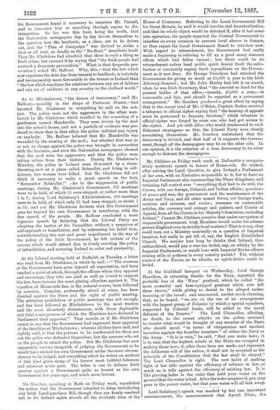As to Mitchelstown, "the demon of inaccuracy," said Mr. Balfour,—possibly
in the shape of Professor Stuart,—had haunted Mr. Gladstone in everything he said on the sub- ject. The police were not the aggressors in the affair men- tioned by Mr. Gladstone which resulted in the wounding of a gentleman named Mandeville. They were driven by the mob into the priest's house, and not a particle of evidence was pro- duced to show that in that affair the police inflicted any injury on anybody. Mr. Balfour believed that Mr. Mandeville was wounded by the stoning of the mob ; but whether that was so or not, no charge against the police was brought in connection with the business, and even the Nationalist newspapers showed that the mob were the aggressors, and that the police were taking refuge from their violence. Daring Mr. Gladstone's Ministry, the police in Ireland were ill-treated by a stone- throwing mob at a place called Belmullet, and firing in self- defence, two women were killed. But Mr. Gladstone did not think it necessary to make a great speech on the text, "Remember Belmnllet !" ...As to the suppression of public meetings, during Mr. Gladstone's Government, 351 meetings were to be held, of which 55 were stopped, or rather more than 1 in 7; during Lord Salisbury's Administration, 400 meetings were to be held, of which only n had been stopped, or about 1 in 33; and yet Mr. Gladstone declares that this Government goes far beyond his own Government in interfering with the free speech of the people. Mr. Balfour concluded a most vigorous speech by declaring that the Liberal Party are adopting the tactics of the Parnellites without a symptom of self-reproach or humiliation, and by reiterating his belief that, notwithstanding this new and great impediment in the way of the policy of the Irish Government, he felt certain of the success which would attend hint in firmly resisting the policy of intimidation, and restoring Ireland to order and prosperity.











 Previous page
Previous page